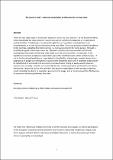Files in this item
We want to sort! Assessing households' preferences for sorting waste
Item metadata
| dc.contributor.author | Czajkowski, M. | |
| dc.contributor.author | Kadziela, T. | |
| dc.contributor.author | Hanley, N. | |
| dc.date.accessioned | 2016-05-31T23:32:38Z | |
| dc.date.available | 2016-05-31T23:32:38Z | |
| dc.date.issued | 2014-06 | |
| dc.identifier | 132517407 | |
| dc.identifier | d8c2f98c-008a-4822-a85e-c03185af5260 | |
| dc.identifier | 84892952604 | |
| dc.identifier.citation | Czajkowski , M , Kadziela , T & Hanley , N 2014 , ' We want to sort! Assessing households' preferences for sorting waste ' , Resource and Energy Economics , vol. 36 , no. 1 , pp. 290-306 . https://doi.org/10.1016/j.reseneeco.2013.05.006 | en |
| dc.identifier.issn | 0928-7655 | |
| dc.identifier.uri | https://hdl.handle.net/10023/8905 | |
| dc.description | Support of Polish Ministry of Science and Higher Education as well as Foundation for Polish Science is gratefully acknowledged. | en |
| dc.description.abstract | There are two major ways in which solid waste can be sorted and recycled - at the household level, when households are required to sort waste into a given number of categories, or in specialised sorting facilities. Traditionally, it has been thought that sorting at the household level is an inconvenience, as it uses space and requires time and effort. Our study provides empirical evidence to the contrary, indicating that home sorting is a net source of utility for some people. Through a carefully designed choice experiment we collected stated choices from members of a Polish municipality with respect to the way their waste is sorted and how often it is collected. In the hypothetical scenario employed, respondents were informed that waste will be sorted anyway - if not at the household level then at a specialised sorting facility. Interestingly, analysis shows that a large group of people are willing to sort waste at the household level even if unsorted waste would be collected at no extra cost. For a minority, increased home sorting of waste would, however, impose a loss of utility. Overall, our results indicate that most respondents preferred to sort waste themselves if given the choice. We provide a few possible explanations of this perhaps surprising result, including the desire to promote a green external image, and a concern about the effectiveness of separation activities performed by others. | |
| dc.format.extent | 17 | |
| dc.format.extent | 724242 | |
| dc.language.iso | eng | |
| dc.relation.ispartof | Resource and Energy Economics | en |
| dc.subject | Recycling | en |
| dc.subject | Choice modelling | en |
| dc.subject | G-MNL model | en |
| dc.subject | Sold waste management | en |
| dc.subject | HB Economic Theory | en |
| dc.subject | G Geography (General) | en |
| dc.subject | Economics, Econometrics and Finance(all) | en |
| dc.subject | SDG 11 - Sustainable Cities and Communities | en |
| dc.subject | SDG 12 - Responsible Consumption and Production | en |
| dc.subject.lcc | HB | en |
| dc.subject.lcc | G1 | en |
| dc.title | We want to sort! Assessing households' preferences for sorting waste | en |
| dc.type | Journal article | en |
| dc.contributor.institution | University of St Andrews. Geography & Sustainable Development | en |
| dc.identifier.doi | https://doi.org/10.1016/j.reseneeco.2013.05.006 | |
| dc.description.status | Peer reviewed | en |
| dc.date.embargoedUntil | 2016-06-01 |
This item appears in the following Collection(s)
Items in the St Andrews Research Repository are protected by copyright, with all rights reserved, unless otherwise indicated.

